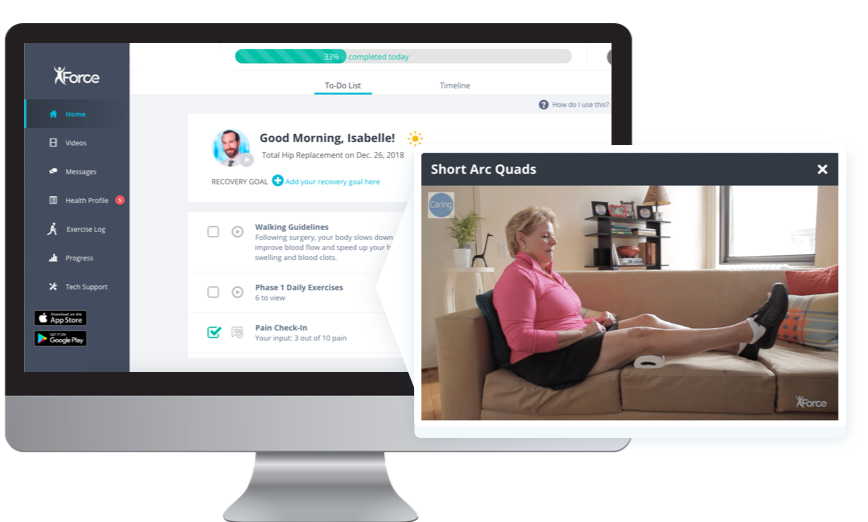
The Department of Orthopaedic Surgery at Brigham and Women’s Hospital is using an innovative digital care platform to manage patients undergoing total hip and knee replacement surgery. Used by several surgeons, including Jeffrey K. Lange, MD, the digital tool enhances clinicians’ ability to deliver comprehensive care around the time of joint replacement surgery by educating, monitoring, and communicating with patients from scheduling to recovery.
The Brigham is among the first few hospitals in Boston to use the digital platform, made by Force™ Therapeutics. To date, several hundred patients have undergone total joint replacement surgery while using the platform with positive results. Since the platform allows patients to access their care plans 24/7, it may enhance compliance to physical therapy (PT) and promote better adherence to pain medication regimens.
“For decades, the Brigham’s Orthopaedic Surgery Department has pioneered joint replacement surgeries, perioperative services, pain management pathways, and PT regimens. Our culture of innovation has allowed us to incorporate new technology into our practice and using this new digital platform is just another example of our dedication to improving surgical care with existing innovations,” says Dr. Lange, a hip and knee surgeon.
A “Home Base” for Customized Instructions and Protocols
Through the platform, patients can access their surgeon’s unique protocols, including prehabilitation regimens months before surgery. With access to customized instructions, patients can take control of their care by preparing their home and/or developing a support network prior to surgery.
“Protocols vary among surgeons, from dealing with post-surgical incisions and pain medication regimens to the timing of PT and managing red flags. Having a home base to deliver reproducible protocols is a game-changer for me, because I can consistently provide the same message to all of my patients in realtime,” says Dr. Lange.
Empowering Patients to Take Control of Their Care
It’s widely acknowledged that one major component of successful surgical outcome is what a patient does when they are not in the hospital.
To this end, the platform was designed to improve adherence to doctors’ orders by giving patients access to important tasks. Patients also receive automatic emails with rehab protocols and expectations before and after surgery.
In addition, patients routinely input their progress and physical outcomes, such as knee range of motion and stiffness after waking. Dr. Lange and others can view their patients’ analytics and adjust their care based on various benchmarks and milestones.
“Through the platform’s communication function, patients can ask questions and report progress. The messaging tool better connects me to my patients, allowing me to have an open and confidential dialogue right on my phone,” says Dr. Lange.
If a patient requires attention, the care team receives an alert. For example, Brigham clinicians are notified if a patient reports an unusually high pain score.
“Patients Seem to Love the Platform,” says Dr. Lange
The Department of Orthopaedic Surgery has been using the digital platform for less than a year, but Dr. Lange and others are currently analyzing outcomes data. Dr. Lange notes that there has been an overwhelmingly positive response from patients.
“My patients appreciate having a home base that’s available 24/7. They love the rehab protocol reminders as well as being able to access their care team so easily,” says Dr. Lange.
Several orthopaedic surgeons are using the platform alongside Dr. Lange, including Wolfgang Fitz, MD, Antonia F. Chen, MD, Vivek M. Shah, MD, and Richard Iorio, MD. Based on early success using the platform, Dr. Lange aims to expand its use to patients undergoing hip and knee revision surgeries.
“The Brigham is continually striving to improve outcomes for our patients in incrementally innovative and meaningful ways, and we look forward continued progress with this very useful digital technology,” says Dr. Lange.